The rumors were true; Kroger is in the process of buying Albertsons in a $25 billion deal. Now, they’ve got a lot of regulatory hurdles to get through in order for the government to allow the sale to happen.
The prospect of these grocery chains merging into the biggest grocery giant out there invites a LOT of questions. Questions like, will some stores close due to the merger? Will some stores be sold? What does Kroger buying Albertsons mean to shoppers? Will we see more Kroger deals? Will prices go down or up? We’ll try to answer what we can.
The FTC sues to stop the Kroger, Albertsons merger.
The FTC has sued to stop the merger between Kroger and Albertsons, claiming it would eliminate competition. Attorneys General from Arizona, California, Illinois, Maryland, Nevada, New Mexico, Oregon, Washington D.C., and Wyoming are joining the lawsuit. The states of Colorado and Washington have already filed lawsuits.
The government alleges the merger would increase food prices (causing a greater financial strain on consumers), decrease the quality of their products and customer service, and harm employee wages, benefits, and potentially working conditions.
Kroger argues that blocking the merger will hurt the consumer and employees, noting the merger will lower prices and provide shoppers with more choices. Kroger and Albertsons intend to fight the lawsuits. Stay tuned.
Kroger announced they’ve reached a deal to buy Albertsons for nearly $25 billion.

Kroger announced their $25 billion all-cash purchase of Albertsons way back on Oct. 14, 2022. But it’s not that simple.
Although Albertsons and Kroger both have agreed to this in principle, creating a massive grocery giant isn’t automatically allowed. Regulatory agencies have to make sure that this is good for shoppers’ budgets, and doesn’t stifle competition.
Kroger has about 10% of the grocery market share in the U.S., and merging with Albertsons would take them up to 15.7%. That would put them within striking distance of Walmart, which has 20.9% of the U.S. grocery market share.
Kroger is currently trying to address the government’s objections. But if and when it’s finally approved, the combined power of Kroger and Albertsons would be good enough to be the largest grocery store in the U.S., with a market share that would challenge industry leader Walmart.
The merger could mean cheaper prices, but fewer promotions and sales.
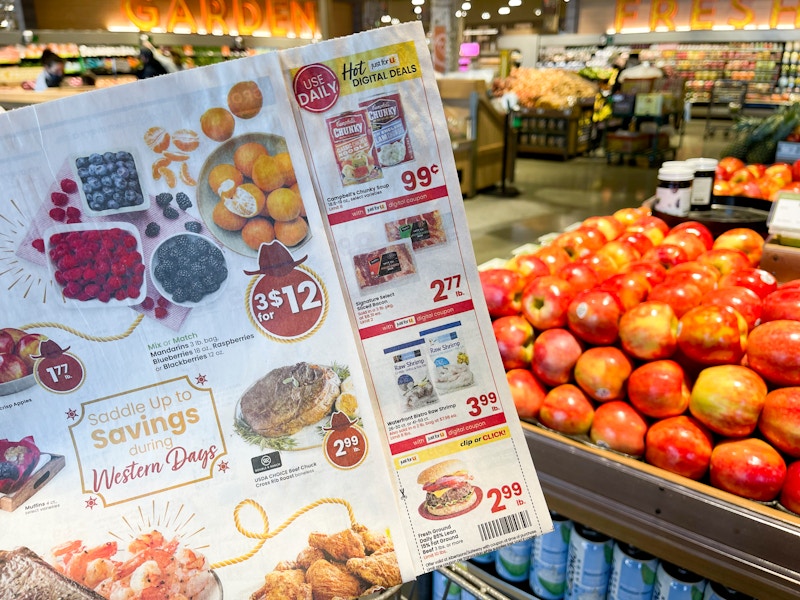
Why does Walmart have lower prices than their competitors? They have the biggest market share and, therefore, better negotiating power. Along the same lines, a bigger Kroger empire would have more clout to negotiate with manufacturers for lower prices and product coupons/promotions.
We could also see Albertsons/Kroger store brands drop in price, as the mega-grocer would have a greater ability to compete with brand names’ prices.
As far as in-store promotions go, expect to see fewer of those, since the new Kroger would have a stronger market share and less of a need to stand out from other grocers. (How many storewide promotions/sales do you see on groceries at Walmart? Pretty much none.)
TIP: If you’re an Albertsons shopper, it’s almost guaranteed that your grocery bill will drop with the merger; Kroger is consistently cheaper than Albertsons on most grocery categories … and they have one of the best couponing policies.
Kroger buying Albertsons would make their footprint double in size.
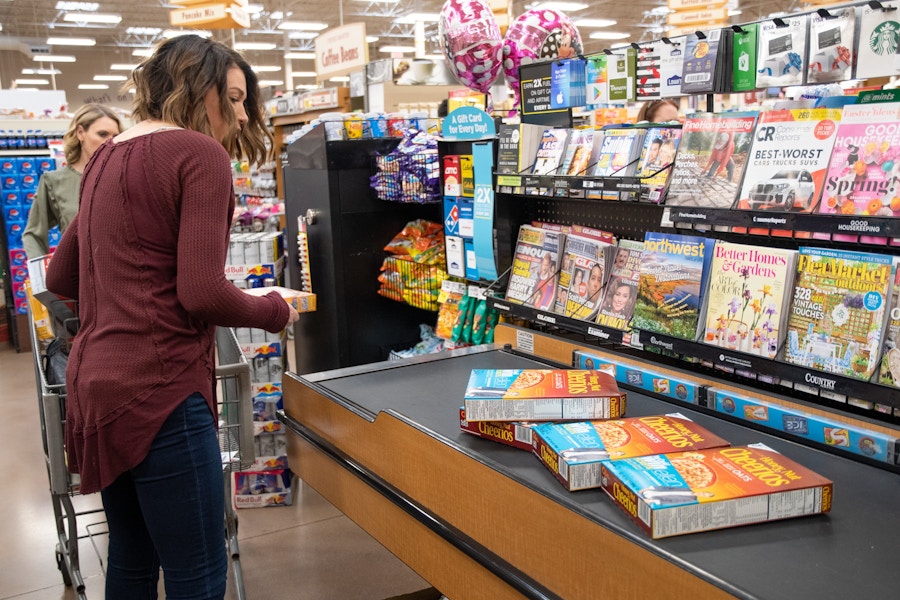
In addition to increasing their U.S. grocery market share from 9.9% to 15.7%, the new-look Kroger would have about 5,000 total stores (and 710,000 employees), encompassing the following subsidiary grocery store chains:
Kroger
Albertsons
Acme
Baker’s
Balducci’s Food Lovers Market
Carrs
City Market
Dillons
Food 4 Less
Foods Co
Fred Meyer
Fry’s
Gerbes
Haggen
Harris Teeter
Jay C
Jewel-Osco
King Soopers
Kings Food Markets
Mariano’s
Metro Market
Owen’s
Pavilions
Pay Less
Pick ‘n Save
QFC
Ralphs
Randalls
Safeway
Shaw’s
Smith’s
Star Market
Tom Thumb
United Supermarkets
Vons
The stores are located in 36 states (plus Washington, D.C.): Alabama, Alaska, Arizona, Arkansas, California, Colorado, Delaware, Florida, Georgia, Idaho, Illinois, Indiana, Kansas, Kentucky, Louisiana, Maryland, Michigan, Mississippi, Missouri, Montana, Nebraska, Nevada, New Mexico, North Carolina, North Dakota, Ohio, Oregon, South Carolina, Tennessee, Texas, Utah, Virginia, Washington, West Virginia, Wisconsin, and Wyoming.
The companies will sell 413 stores to satisfy government requirements.

Kroger and Albertsons have a lot of store overlap in competitive areas, particularly on the West Coast. As part of the merger, the government would likely require “asset sales” — which means the mega-grocer needs to sell some locations. As of 2023, Kroger has 2,719 stores in 35 states, while Albertsons has 2,200 stores in 34 states and Washington, D.C.
According to a recent report by Reuters, Albertsons and Kroger are planning to sell over 400 stores to C&S Wholesale Grocers in early 2024 for $2 billion. The stores they’re offloading are located in the areas where Kroger and Albertsons overlap, such as in the Pacific Northwest and the Midwest. Here are the states and stores that will be impacted, according to Winsight Grocery Business:
Alaska — 14 Albertsons stores
Arizona — 24 Albertsons stores
California — 66 Albertsons and Kroger stores
Colorado — 52 Albertsons stores
Idaho — 13 Albertsons stores
Illinois — 14 Kroger stores
Maryland, Virginia, and Washington, D.C. — 10 Harris Teeter stores
Montana, Utah, and Wyoming — 12 Albertsons Cos. stores
Nevada — 15 Albertsons stores
New Mexico — 12 Albertsons stores
Oregon — 49 Albertsons and Kroger stores
Texas and Louisiana — 28 Albertsons stores
Washington — 104 Albertsons and Kroger stores
Additionally, C&S will acquire these Kroger-owned brands:
QFC (in the Pacific Northwest)
Mariano’s (in Illinois)
Carrs (in Alaska)
Brush up on your money-saving tips at both stores.

While there are still a lot of unknowns, it’s clear that you won’t see major changes at your go-to grocery store in the near future. But just in case you’ve never shopped at Albertsons (or Kroger) before, we can teach you how to coupon at Kroger and how to coupon at Albertsons — so when the time comes, you’ll know exactly how to save money on your grocery bill.











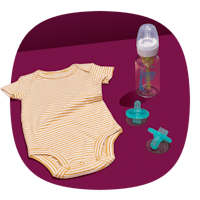
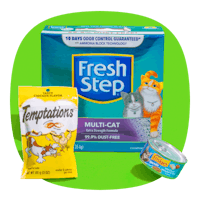

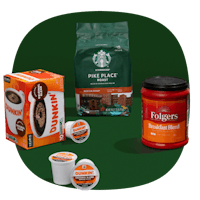





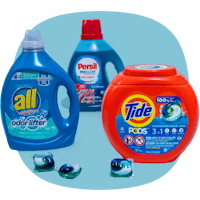

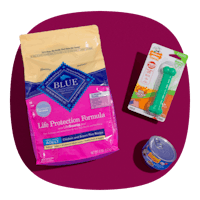









Tell us what you think